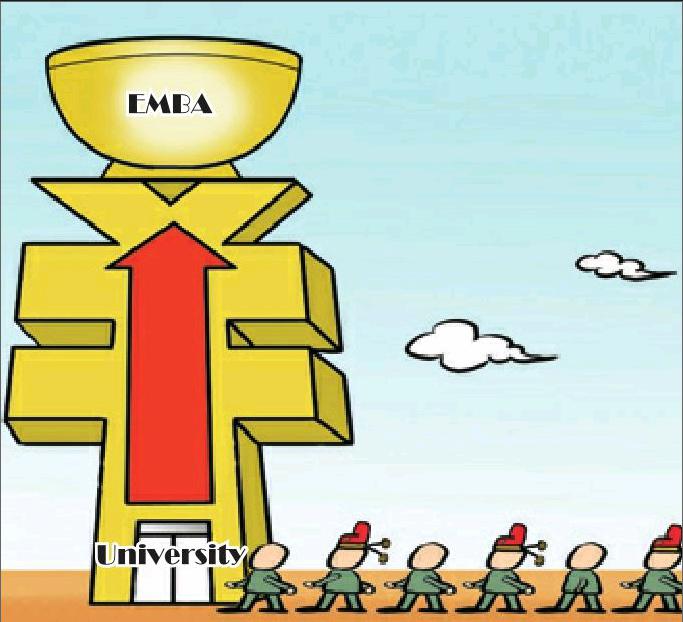Hotbed for Corruption?
2014-09-23ByYinpumin
By+Yin+pumin

once again, the deluxe Executive Master of Business Administration (EMBA) program has come under fire in China.
On July 15, Chinas official Xinhua News Agency published a report, revealing that many Chinese EMBA programs, though originally designed as a career boost for business elites, have seen high enrollment of government officials.
A roll obtained by Xinhua from a top Chinese business school shows there are 11 officials among the 149 students in its EMBA class, including a vice mayor.
He Jie, a political advisor in south Chinas Guangdong Province, proposed banning officials from attending such courses during a session of the Guangdong Provincial Committee of the Chinese Peoples Political Consultative Conference in January. Citing his studies on EMBA programs in China, He said that such programs have little benefit for officials competence but serve mostly as a platform for networking.
“Some business people wish to access more resources by getting to know officials, while the latter may hope to trade their power for personal gains. EMBA programs could offer such junctions,” He said.
Zhu Lijia, a professor at the Beijing-based Chinese Academy of Governance, said that by making company heads “classmates” of the officials, such EMBA programs may “facilitate the formation of corrupt groups.”
dubious goals
Unlike the Master of Business Administration(MBA), which focuses on cultivating students or middle-level business workers into business managers, the EMBA is aimed at helping senior corporate executives build the essential capabilities, networks and confidence to progress to the next step in their careers.
In 1995, Chinas first EMBA program was launched by the China Europe International Business School in Shanghai. In 2002, the EMBA was officially recognized by the Ministry of Education. Since then on, EMBA programs have sprouted out around the country.
However, this flourishing of new EMBA programs have also brought unexpected controversies, such as high tuition fees and a worrying number of participants from government agencies.
According to data from Tsinghua University, in its autumn EMBA course in 2013, 9 percent of the students were government officials, while 35 percent came from state-owned enterprises(SOEs).
The situation at Peking University is similar. A member of the schools recruitment department told Xinhua that Peking Universitys EMBA programs are popular with government officials. “Weve enrolled enough students for four classes starting in September. Each class has 20 students, and half of them are officials,” the anonymous contact said.endprint
The said course has special requirements for the ranks and positions of the officials applying. “Its only open to officials above the county head level,” said another recruitment staff member surnamed Yu with Peking University.
According to Yu, the program charges 668,000 yuan ($108,750) in tuition fees, not including expenses for overseas visits or domestic junkets held by local government heads.
The program lasts two years and the class meets for two to four days every two months, during which field trips will be organized both at home and abroad to broaden the students horizons, Yu explained. She added that the school has arranged for officials from local governments to receive the students during the field trips, which is expected to facilitate networking and development of ties.
“We dont issue academic certificates, but being our student can help you expand you connections,” Yu said.
An anonymous manager at a SOE who has attended three EMBA courses respectively in Tsinghua University, Peking University and Beijing Normal University, said that the main goal for EMBA students in China is to extend their networks. “Attending class with business people and government officials, you can build a large network linking both political and business circles,” he said.
According to him, about one quarter of the students in the courses he attended were government officials, and the majority of remaining others were from big SOEs.
According to the Xinhua report, there are more than 100 EMBA programs in China that openly advertise themselves as having“high-ranking officials” as students to attract entrepreneurs to participate.
Such advanced management programs are generally expensive. A report by the Beijing Youth Daily revealed tuition fees for the programs range from 400,000 yuan ($65,120) to as high as 1 million yuan ($162,800) each.
The high tuition fees have raised suspicions over misuse of public money.
“Most business people pay the tuition fees themselves, while the government pays half or all of the fees for officials,” said the SOE manager who has attended the three EMBA courses.
Anti-graft researchers say that the use of public money by officials for personal activities, including further study, is also a form of corruption and have recommended the government ban this practice.
In other cases, some EMBA programs willingly deduct or even scrap tuition fees for officials.endprint
The Peking University program, for instance, has a policy of “exempting tuition if an official can bring three other entrepreneurs to the class.”
There have been reported cases where officials treat entrepreneurs to meals and entrepreneurs offer to help officials pay their tuition fees in return, a reciprocal relationship that helps forge ties and connections for both.
“By so doing, the tuition fees of those government officials are actually shifted to entrepreneurs,” said Li Chengyan, a professor at Peking Universitys School of Government, indicating that such practice is also corruptionprone.
One example is Wang Yi, former vice Chairman of the China Securities Regulatory Commission and one of the founders of the EMBA program at Guanghua School of Management of Peking University. He was once influential enough to attract huge numbers of students to the course, though he later received a suspended death sentence over bribery charges in 2010.
Worrying trend
Considering the situation of EMBA program in China, several members of the Guangdong Provincial Committee of the Chinese Peoples Political Consultative Conference put forward a proposal in January to ban officials from participating in these costly programs.
“EMBA programs are for business managers and entrepreneurs, and do not provide essential knowledge for officials. Instead, they offer a platform for business people and officials to extend their social network, an act that could possibly lead to corruption,” the proposal said. It suggested officials be encouraged to take Master of Public Administration programs.
Except for a few popular programs like those of Tsinghua and Peking universities, EMBA recruitment has already witnessed a decline, according to media reports.
“The number of government officials and senior managers of SOEs participating in costly EMBA programs has dropped sharply following the governments anti-corruption measures,”said a report in the Beijing Youth Daily in early July.
“Local governments and SOEs have tightened their expenses on sponsoring the further study of senior officials,” a professor at a renowned business school who declined to be named told the Beijing-based newspaper.“Average schools are the most affected as it has become quite difficult for them to recruit students this year.”
Top-tier universities have been affected too. An employee of the EMBA Admissions Office at the Business School of the Beijing-based Renmin University of China, who spoke on condition of anonymity due to the sensitivity of the subject, said that they had received only 37 applications as of late June, not even enough for a single class. “Many government officials are forgoing their applications after the Communist Party of China (CPC) introduced the eight-point anti-decadence regulation,” the employee said.endprint
The regulation, which was adopted by the Political Bureau of the CPC Central Committee in December 2012, urges officials to “get close to the public” by eliminating “undesirable work styles,” including extravagance, hedonism and excessive bureaucracy.
It is in line with the ongoing anti-corruption campaign that targets both “tigers” and “flies,”referring to corrupt officials at both senior and lower-ranking levels.
However, some stakeholders hold that EMBA programs are not the root cause of corruption.
“The majority of the students in our courses come from private businesses and foreign companies, while government officials make up less than 10 percent,” Li Ni, an EMBA professor at a business school in Shanghai, told the Shanghaibased China Business News.
“Even if collusion between officials and business people does exist, it doesnt have to be achieved through an EMBA program,” Li argued.“The key to curbing collusion is not banning officials from studying EMBA, but containing it within the ‘cage of regulations.”
The impacts of such programs can also be viewed in a more positive light. Some local officials from remote regions have managed to boost the local economy and attract investment through studying EMBA in big cities, China Business News reported.
Li said that officials can also benefit from the knowledge learned in EMBA programs. Studying business management will not only help them form better related policies and training staff, but will also benefit their career planning, according to him.endprint
